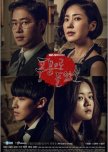“No-one can make you feel inferior unless you give them permission.” (Eleanor Roosevelt)
If you are someone who can see through the facade to the merciless pen underneath, then you will love this drama. The writer, Jung Sung Joo, shares Jane Austen’s ability to allow characters to damn themselves through the words that emerge from their own mouths, and she reveals a feast of dangerous stupidity and ignorance, stuffed full of self importance, pompous delusion and total helplessness.
The art of good satire is to clearly reveal the self interest and evil hidden behind the veil (such an apt anagram!) which the powerful draw over it. This show does that in spades. Hysterically funny at the start as it draws the lines of battle. Then it inches down the road to seriousness until, twisting the knife, the cost in suffering of the abuse of power is laid bare. However funny it is, this drama is a deeply serious comment on the use and abuse of power in a society in transition to the modern, and the underlying ruthless, self-interested principles that guide it.
The skill of the writer is so much more subtle than simply mocking and attacking. The script, in the wonderful hands of director Ahn Pan Seok, simultaneously unfolds multiple perspectives on a situation. Laughter and anger share the same space. One second judgemental, the next sympathetic towards the same character. The music (by Lee Nam Yeon) is a masterpiece of counterpoint and a character in itself, as is the suffocating environment of the house.
This biting satire on class and privilege may not make a great deal of sense to people from more notionally egalitarian societies without a history of aristocracy. The true aristocracy are not people who have wealth and power because they have made it on their own merit, or through business dealings or corruption, like the chaebol (who also feature in the story). Their wealth, power and status is totally unearned by them individually. They view it as their inalienable/natural birthright and that they are the custodians that must hand their power and values on, intact, to the next generation. Hence, Han Jung Ho’s bizarre insistence that the “children” study Machiavelli’s “The Prince” in scenes that made me cry with both laughter and despair.
Part of the humour and satire stems from the fact that the Han family is not truly aristocratic (the father is third generation nouveau riche) but they ape the values of the aristocracy. They do it with the clumsy, narrow-minded misunderstanding and thoroughness that only the aspiring can have, and in the process wreak devastating havoc on everyone else. The corrupted worship of tradition and ceremony may be ridiculous, but make no mistake, the power is real and dangerous.
The script plays on the blindness at the heart of the Han parents to the privilege that feeds their all consuming self interest. Having never known anything else they cannot think outside the box. In a wonderful moment in Ep 6, the father (Han Jung Ho) claims a spurious egalitarian credibility for himself by smugly announcing that everyone, whatever their status, shares the same style of office space in his law firm and adds, “what does being aristocratic count for these days, we’re all civilians now”. Their ignorance and ego offers much opportunity for manipulative, servile flattery which in writer Jung Sung Joo’s hands becomes a crowning work of art. Especially in the sycophantic performance of a lifetime by Kil Hae Yeon as Secretary Yang. My favourite line of hers being (in the context of imagined alopecia) “Don’t worry, Caesar didn’t have much hair either.” To which Han Jung Ho’s reply is, “Truly, you’re the only one who reads my mind.”
But behind the savagery of the satire lies a humanity that reveals how trapped the Han parents are in the vice-like grip of the world that they have created from their delusion of superiority and the personal price they are condemned to pay for continuing to uphold it.
As with the ending of Secret Love Affair, another exceptional offering by this writer and director combination, the ending is perfect. There is no trite papering over cracks, although I could have wanted the lead up to it to be better. Whoever ordered the cutting of the number of episodes late in the day is a philistine worthy of being employed at Hansong! Having said that, my only criticism is that overall the script could have done with an editor’s pencil. It is expansive in the extreme, and although it mostly holds the attention, it would have been tighter and sharper commissioned for 24 episodes, rather than the 30 it ended up being. The cast and direction are legendary and walk as close as humanly possible to the edge of the cliff without falling over.
As a piece of satire this is 20/10, but as a drama, it has a few pacing faults. I cannot recommend it enough if you are someone who likes to be challenged to think when watching. It is a superb piece of drama.
What my rating means: 9+ A drama I totally fell in love with and is endlessly re-watchable. It ticked all the boxes and had some serious wow factor. It would go on my personally recommended list.
The art of good satire is to clearly reveal the self interest and evil hidden behind the veil (such an apt anagram!) which the powerful draw over it. This show does that in spades. Hysterically funny at the start as it draws the lines of battle. Then it inches down the road to seriousness until, twisting the knife, the cost in suffering of the abuse of power is laid bare. However funny it is, this drama is a deeply serious comment on the use and abuse of power in a society in transition to the modern, and the underlying ruthless, self-interested principles that guide it.
The skill of the writer is so much more subtle than simply mocking and attacking. The script, in the wonderful hands of director Ahn Pan Seok, simultaneously unfolds multiple perspectives on a situation. Laughter and anger share the same space. One second judgemental, the next sympathetic towards the same character. The music (by Lee Nam Yeon) is a masterpiece of counterpoint and a character in itself, as is the suffocating environment of the house.
This biting satire on class and privilege may not make a great deal of sense to people from more notionally egalitarian societies without a history of aristocracy. The true aristocracy are not people who have wealth and power because they have made it on their own merit, or through business dealings or corruption, like the chaebol (who also feature in the story). Their wealth, power and status is totally unearned by them individually. They view it as their inalienable/natural birthright and that they are the custodians that must hand their power and values on, intact, to the next generation. Hence, Han Jung Ho’s bizarre insistence that the “children” study Machiavelli’s “The Prince” in scenes that made me cry with both laughter and despair.
Part of the humour and satire stems from the fact that the Han family is not truly aristocratic (the father is third generation nouveau riche) but they ape the values of the aristocracy. They do it with the clumsy, narrow-minded misunderstanding and thoroughness that only the aspiring can have, and in the process wreak devastating havoc on everyone else. The corrupted worship of tradition and ceremony may be ridiculous, but make no mistake, the power is real and dangerous.
The script plays on the blindness at the heart of the Han parents to the privilege that feeds their all consuming self interest. Having never known anything else they cannot think outside the box. In a wonderful moment in Ep 6, the father (Han Jung Ho) claims a spurious egalitarian credibility for himself by smugly announcing that everyone, whatever their status, shares the same style of office space in his law firm and adds, “what does being aristocratic count for these days, we’re all civilians now”. Their ignorance and ego offers much opportunity for manipulative, servile flattery which in writer Jung Sung Joo’s hands becomes a crowning work of art. Especially in the sycophantic performance of a lifetime by Kil Hae Yeon as Secretary Yang. My favourite line of hers being (in the context of imagined alopecia) “Don’t worry, Caesar didn’t have much hair either.” To which Han Jung Ho’s reply is, “Truly, you’re the only one who reads my mind.”
But behind the savagery of the satire lies a humanity that reveals how trapped the Han parents are in the vice-like grip of the world that they have created from their delusion of superiority and the personal price they are condemned to pay for continuing to uphold it.
As with the ending of Secret Love Affair, another exceptional offering by this writer and director combination, the ending is perfect. There is no trite papering over cracks, although I could have wanted the lead up to it to be better. Whoever ordered the cutting of the number of episodes late in the day is a philistine worthy of being employed at Hansong! Having said that, my only criticism is that overall the script could have done with an editor’s pencil. It is expansive in the extreme, and although it mostly holds the attention, it would have been tighter and sharper commissioned for 24 episodes, rather than the 30 it ended up being. The cast and direction are legendary and walk as close as humanly possible to the edge of the cliff without falling over.
As a piece of satire this is 20/10, but as a drama, it has a few pacing faults. I cannot recommend it enough if you are someone who likes to be challenged to think when watching. It is a superb piece of drama.
What my rating means: 9+ A drama I totally fell in love with and is endlessly re-watchable. It ticked all the boxes and had some serious wow factor. It would go on my personally recommended list.
Was this review helpful to you?


 3
3 2
2

















